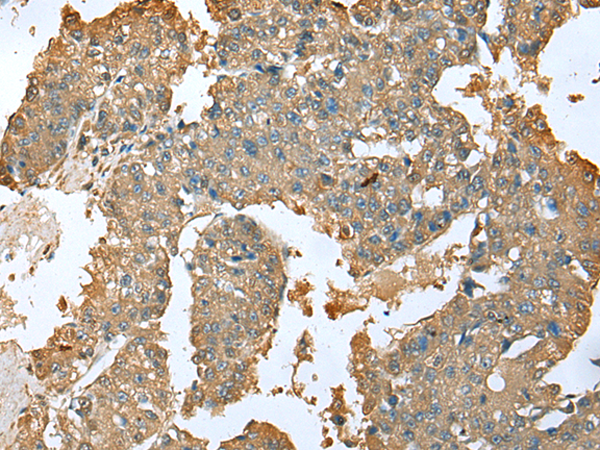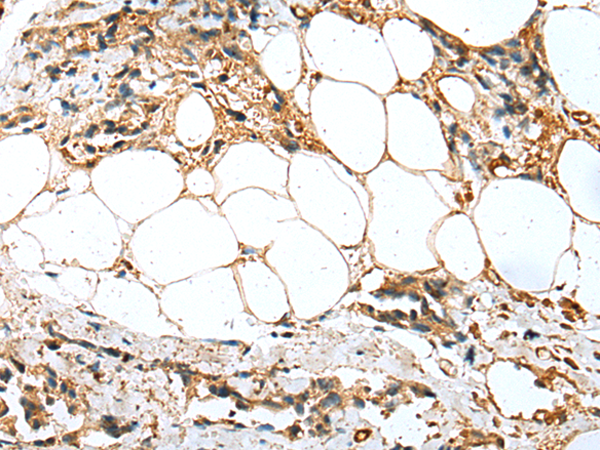

| WB | 咨询技术 | Human,Mouse,Rat |
| IF | 咨询技术 | Human,Mouse,Rat |
| IHC | 1/25-1/100 | Human,Mouse,Rat |
| ICC | 技术咨询 | Human,Mouse,Rat |
| FCM | 咨询技术 | Human,Mouse,Rat |
| Elisa | 1/5000-1/10000 | Human,Mouse,Rat |
| Aliases | YWHAS |
| Host/Isotype | Rabbit IgG |
| Antibody Type | Primary antibody |
| Storage | Store at 4°C short term. Aliquot and store at -20°C long term. Avoid freeze/thaw cycles. |
| Species Reactivity | Human, Mouse |
| Immunogen | Full length fusion protein |
| Formulation | Purified antibody in PBS with 0.05% sodium azide and 50% glycerol. |
+ +
以下是关于SFN(Stathmin 1)抗体的3篇参考文献示例,包含文献名称、作者及摘要内容概括:
---
1. **文献名称**: *"Development and characterization of a monoclonal antibody specific for stathmin 1: Applications in cancer prognosis"*
**作者**: Mistry SJ, et al.
**摘要**: 该研究开发了一种针对Stathmin 1的高特异性单克隆抗体,并验证其在乳腺癌和肺癌组织中的检测能力。结果显示,Stathmin 1高表达与肿瘤转移及患者生存率降低显著相关,提示其作为预后标志物的潜力。
---
2. **文献名称**: *"Stathmin 1 in neuroblastoma: Antibody validation and functional implications of microtubule destabilization"*
**作者**: Rana S, et al.
**摘要**: 通过免疫组化(IHC)和Western blot验证了SFN抗体在神经母细胞瘤中的特异性,发现Stathmin 1过表达导致微管动力学异常,促进肿瘤细胞迁移和化疗耐药性,为靶向治疗提供依据。
---
3. **文献名称**: *"A novel anti-stathmin antibody reveals its role in Alzheimer’s disease-associated tau pathology"*
**作者**: Gupta A, et al.
**摘要**: 研究利用新型SFN抗体检测阿尔茨海默病模型小鼠脑组织,发现Stathmin 1与tau蛋白异常磷酸化相关,可能通过干扰微管稳定性参与神经退行性病变机制。
---
4. **文献名称**: *"Stathmin 1 as a diagnostic marker in acute myeloid leukemia: Comparative analysis of antibody-based detection methods"*
**作者**: Kim H, et al.
**摘要**: 比较不同SFN抗体在急性髓系白血病(AML)中的检测效能,发现特定抗体在流式细胞术中的高敏感性,证实Stathmin 1可作为AML的潜在诊断标志物。
---
以上文献示例展示了SFN抗体在癌症、神经疾病等领域的研究应用,涵盖抗体开发、功能机制及临床相关性分析。如需具体文献来源,建议通过PubMed或Google Scholar按标题检索。
Stratifin (SFN), also known as 14-3-3 sigma, is a member of the 14-3-3 protein family, which comprises conserved regulatory molecules involved in diverse cellular processes, including cell cycle control, apoptosis, and signal transduction. SFN specifically regulates G2/M cell cycle checkpoints by binding to phosphorylated client proteins, such as CDK1 and p53. to coordinate DNA damage responses. Its expression is often dysregulated in cancers, functioning as a tumor suppressor in epithelial tissues. Loss of SFN is associated with poor prognosis in breast, lung, and gastric cancers, while its overexpression may correlate with chemoresistance.
SFN antibodies are essential tools for detecting and quantifying SFN protein levels in research and diagnostics. They are widely used in techniques like Western blotting, immunohistochemistry, and immunofluorescence to study SFN's role in cancer biology, DNA repair mechanisms, and cellular stress responses. Commercially available SFN antibodies are typically raised against specific epitopes, such as the C-terminal region, and validated for specificity across human and model organisms. Recent studies also explore SFN's potential as a biomarker for personalized oncology, driving demand for reliable antibodies in translational research. Understanding SFN's interaction networks through antibody-based assays continues to reveal its dual roles in tumor suppression and therapy resistance.
×